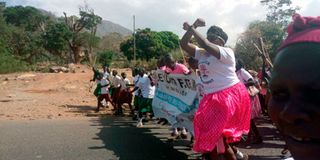West Pokot: Mothers-in-law blamed for rise in FGM

Women demonstrating against FGM during the International Day of Zero Tolerance of FGM at Ortum in West Pokot County last year.
What you need to know:
- In the Pokot culture, women who have not undergone the cut are treated like children hence not allowed to do certain chores.
- A Pokot Council of Elder Mastait Lockles says the vice is so rooted in the community with cases of people retrieving bodies of women buried without being circumcised, on the rise.
Pressure from mothers-in-law and husbands has been blamed for rising cases of Female Genital mutilation (FGM) in West Pokot County.
In a county where illiteracy levels are at 67 per cent, the mothers-in-law and men are influential in determining when FGM is performed and to whom, often by mounting pressure on the young women who have not undergone the cut.
In the Pokot culture, women who have not undergone the cut are treated like children hence not allowed to do certain chores. Many newly-married women are thus, forced to get the cut.
This belief has contributed to the high number of FGM cases in the county. The prevalence among women and girls aged between 15 and 49 years stands at 74 per cent, more than triple the national average of 21 per cent, according to a recent study by the United Nations Children’s Emergency Fund (Unicef) and World Vision.
Komesi Women Network Organisation chairperson Susan Krop now wants the government to intervene.
Uncircumcised women
“Those who evade FGM while still at their parents’ homes face the cut in their matrimonial homes. Mothers-in-law don’t allow uncircumcised women in their homes. They insult them saying they are still green and are not allowed to milk the animals or cook for guests, they are also not allowed to be the first to fetch water. They are not allowed to stand at the door or enter the house,” Ms Krop says.
She adds that these women’s husbands will always complain that their food is not well cooked.
“Even the learned ones still undergo the practice.”
Ms Krop says elders are the biggest stumbling block in the fight to eradicate the vice.
“Elders claim there will be hunger and drought if girls are not circumcised,” Ms Krop explains.
Irep Foundation Director Domtillah Chesang, who describes the vice as a violation of human rights, says poverty has also contributed to the many cases in the county.
The activist says girls in villages suffer in silence; some need urgent medical attention but are hiding for fear of being arrested.
Hidden in bush
“We need our girls alive. We must rescue them and give them medical attention, they need psychological support, they are traumatised, and hidden in the bush. Chiefs are working round the clock to ensure those involved face the law,” she says.
A Pokot Council of Elder Mastait Lockles says the vice is so rooted in the community with cases of people retrieving bodies of women buried without being circumcised, on the rise.
“In August last year, we were left in shock after a woman's body was retrieved and reburied after she was cut,” Mr Mastait says of the bizarre incident.
He says it is against Pokot culture to retrieve dead bodies from the grave and wonders how the perpetrators got the courage to perform FGM on the dead.
Cheposera Ritaa, an FGM victim and reformed circumciser, says women circumcisers are ready to join the anti-FGM fight but points out that the culture is so deep rooted that they are at times drawn back.
‘Although most girls are against the practise, our people still value culture very much. Some politicians even use it as a campaign tool,” she said.
Pokot Central Deputy County Commissioner Simiyu Were says many girls in the county aged below 18 years, are forced to engage in daily activities to help fend for the families.
“Many girls are married off at a tender age, raising poverty levels,” he says.





